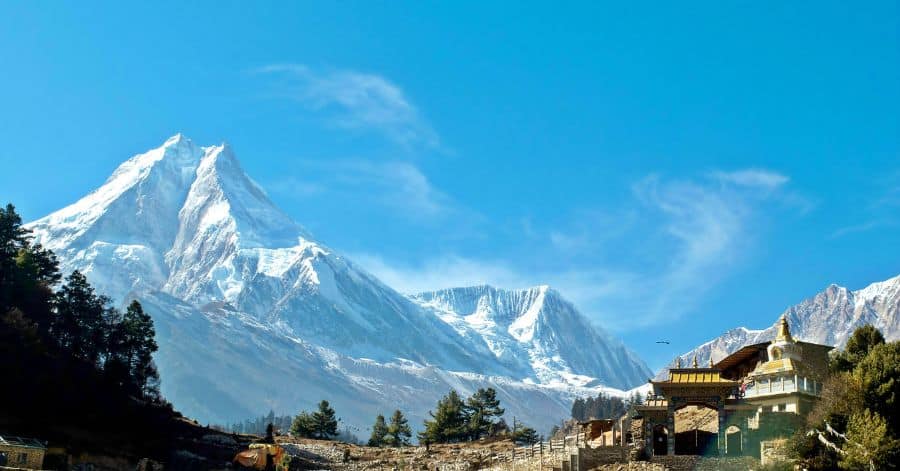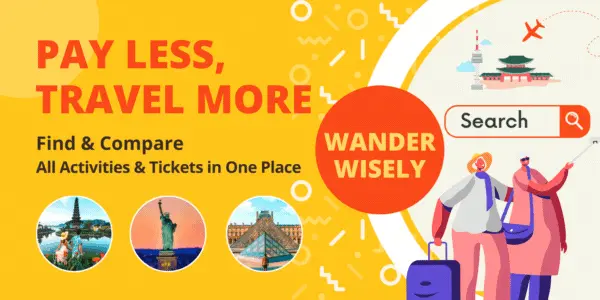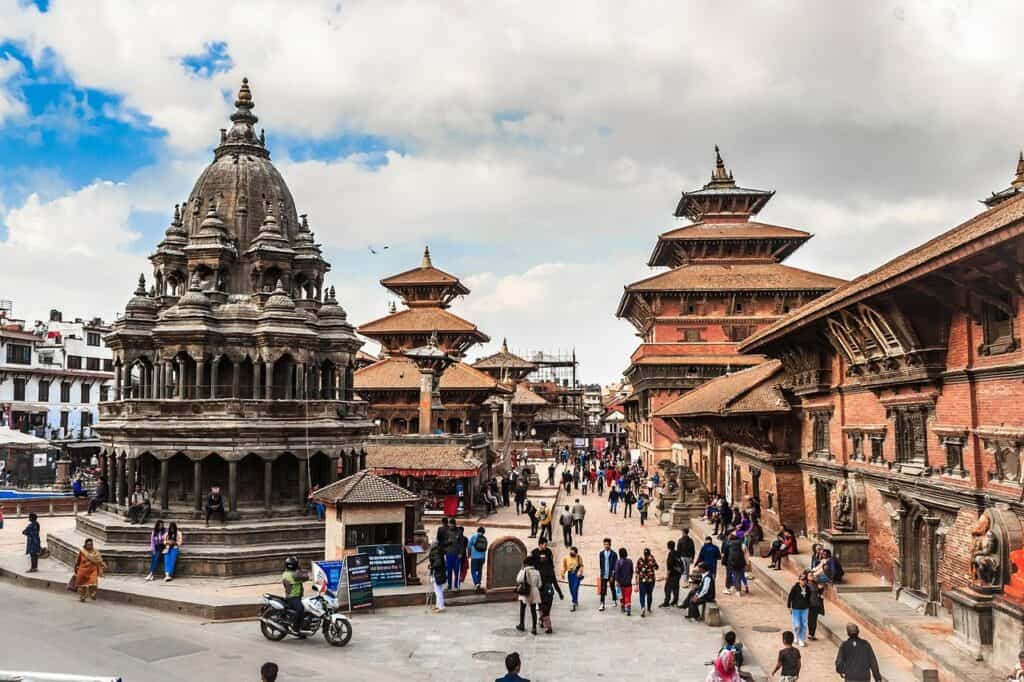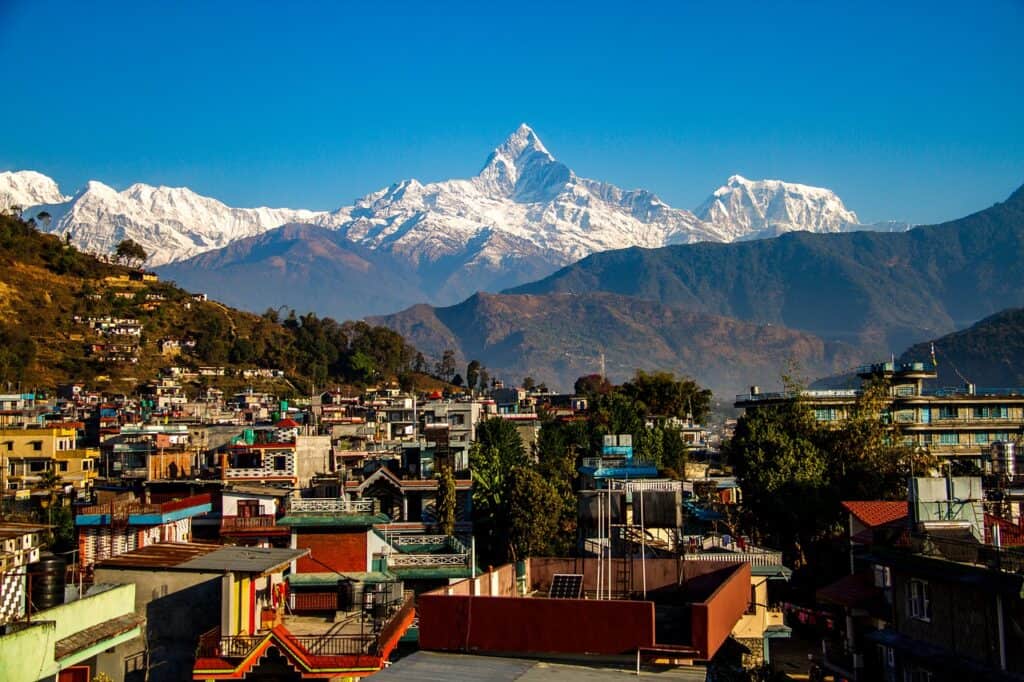A small landlocked country in South Asia, Nepal is one of the most famous tourist destinations in the world. The reason? Nepal’s scenic landscapes, rich cultural heritage, mountainous geography, and religious sites contribute to its popularity.
Also, the Nepalese people’s hospitable and friendly nature will make every visitor feel at home. We follow Atithi Devo Bhava to the t and treat every foreign guest as family. Also, did you know Nepal is the birthplace of Lord Buddha? Lumbini, for that matter, is the ultimate destination of pilgrims worldwide.
If you are still unconvinced, follow us through this ultimate guide to Nepal, where we will provide tips on Nepal travel and everything you need to know about the country.
Basic Things to Know Pre-Nepal Trip
Before making travel plans, I believe knowing about that place’s background, culture, people, and lifestyle is essential. These things will give you knowledge about that country and prepare you beforehand. And in today’s sensitive age, you must be cautious in whatever you do so as not to offend.
History of Nepal
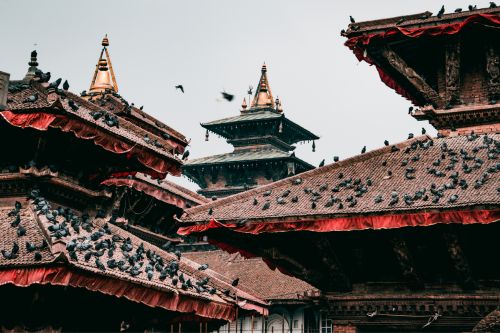
Nepal’s history can be traced back to the 30th Century BC. There are traces of people’s settlement during the Neolithic and Paleolithic ages. However, the written accounts mention Gopal Bansal as Nepal’s first ruler.
The Mahishapalas, Kirat, Licchavi, Malla, and Simroun people followed them. Initially, Nepal was not a single country but a group of small kingdoms. King Prithvi Narayan Shah unified the nation to its present state by annexing all small kingdoms into one.
The late King was from Gorkha and led his people to fight three renowned Malla Kings of Bhaktapur, Lalitpur, and Kathmandu. The Gorkhali people’s ferocious nature and bravery soared their popularity worldwide. Even now, the Gurkhas are active in battlefields and wars.
The Shah Kings ruled Nepal until the nation was declared a Federal Democratic Republic in 2008. Over the years, there have been lots of political turmoil, power shifts, formation and dissolution of political parties, and controversies. Still, Nepal is progressing steadily in travel, tourism, and development.
Check Out These Handpicked Activities:
Nepali Culture: A Rich Tapestry of Multiple Ethnicities And Communities
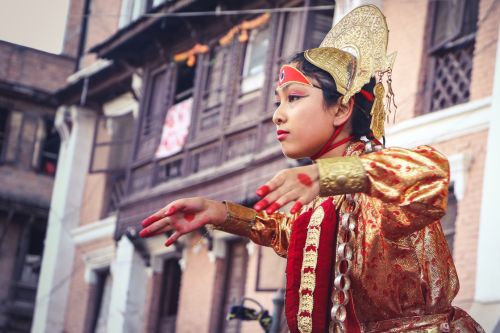
While politics has dominated much of Nepal’s history, we can’t leave out Nepali culture that has preserved and continued the Nepalese legacy. The nation boasts a diverse culture encompassing multiple ethnic groups, communities, tribes, and minorities.
Each group has its language, traditions, festivals, dances, and music. Aside from the official Nepali language, there are over 120 languages spoken in the country. Most languages are Maithili, Tamang, Tharu, Bhojpuri, Newari, and Magar. The Rai community alone has over 20 languages.
It might take some time for visitors to get used to Nepali culture. Nonetheless, they can enjoy many festivals and celebrations and experience diverse lifestyles.
Check Out These Handpicked Activities:
- Nepal Cultural Highlights Tour In 10 Days
- Kathmandu World Heritage City Sightseeing Cultural Tour
- Nepal Cultural & Adventure
Nepali Arts and Architecture

Nepali culture has heavily influenced its architectural works. Citizens primarily follow the Hindu religion here so that you will see many Hindu shrines, temples, and architectural buildings.
Speaking of which, Nepal’s pagoda-styled temples are famous worldwide. For instance, Pashupatinath temple is a holy place for Nepali and Indian Hindu devotees. Other renowned pagoda buildings include Nyatapola, Kathmandu Durbar Square, and Kasthamandap Temple.
Nepali architecture also includes the Stupa and Shikhara styles (influenced by the Tibetan style). Renowned architectural buildings of these styles are Swayambhunath Stupa, Boudhanath Stupa, Namobudha, Krishna Mandir, and more.
Check Out These Handpicked Activities:
- Private Kathmandu Top 4 UNESCO World Heritage Sites – Day Tour
- Discover Pashupatinath, Boudanath, and Patan Durbar Square
- Dakchinkali Temple Tour
Nepali Music and Dance
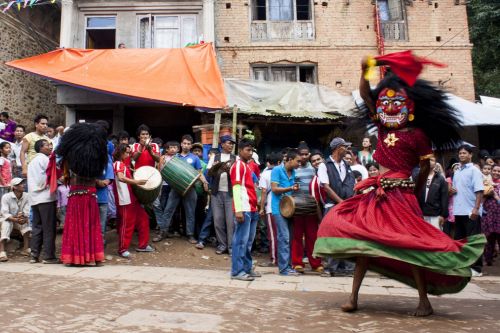
Nepali music and dance is a mix of traditional and Western genres. The ancient Nepali dance has to be the tandava dance, originating in the Himalayan region. However, Nepali dances vary per location, ethnicity, religion, and community.
For instance, the Newari community performs the Lakhey dance on the streets during jatras. Maruni, another oldest Nepali dance, is done by the Magar community. Additionally, the Deuda dance is popular in the far western province.
Nepal’s traditional music uses instruments like madal, flute, sarangi, harmonium, murchunga, and jhyamta. Speaking of which, Damai Panche Baja is primarily played during weddings.
At present, Nepal’s music landscape has seen a dynamic change. Influenced by Western culture, musicians have explored genres such as hip-hop, pop, modern, trap, and K-pop.
Check This Handpicked Activity:
Nepali Festivals and Celebrations
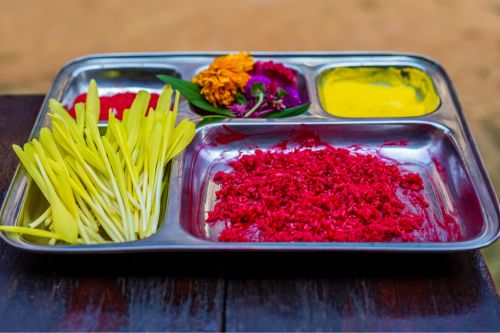
We, Nepalese people, love celebrating festivals. It is so extreme that we celebrate over 50 festivals over the 365 days. As such, we have many public holidays throughout the year.
Nepal’s highly celebrated festival has to be Dashain, a ten-day celebratory occasion of worshipping Hindu gods and goddesses, sacrificing animals, and receiving tikas and blessings from elders. Second is Tihar, a five-day celebration that comes after Dashain.
Other renowned festivals are Bisket Jatra, Lohsars, Christmas, Eid, Sankrantis, and more. There are no qualms for celebrating any of these festivals. You can participate even if you don’t follow that particular religion.
Check These Handpicked Activities:
Planning Travel in Nepal
Now that we have covered the basic things about Nepal, let’s discuss travel planning. You must plan well for any trip; Nepal’s trip is also no exception. So, be sure to check out the following points to ensure your trip goes smoothly:
- Before you go on your Nepal trip, make sure to do some pre-research about the country. You can read our article and buy some Nepal travel guidebooks.
- If traveling specifically to Nepal, you likely have to board a plane. We have an open border with India, but it is not available for other countries’ citizens besides Indians and Nepali.
- Nepal is a year-round destination. Still, there are certain seasons and times when it’s perfect to travel. For instance, the Fall (late September to late November) is the best time to plan a Nepal trip, as the weather is stable and suitable for outdoor visits.
- If you are going on trekking, be sure to avoid the summer monsoon season from June to September.
- Foreigners can’t drive a vehicle on the streets without a Nepali license. So, be prepared to take a public means of transportation.
- Nepal’s road conditions and traffic are bad in general. You might face long city traffic jams and muddy and congested roads in hilly areas. Pay attention to road safety.
- Book a ticket beforehand to explore famous tourist destinations or heritage sites.
- Ask for a local guide to help you during your trip. Local guides can show you around and provide more information than guidebooks.
- You should learn about the do’s and don’ts so as not to cause offense or cultural appropriation.
- You should refrain from hugging, kissing, and skinship during your first meeting with Nepali people. We are very conservative and not open to PDAs. So, a polite handshake or Namaste will work.
- Before visiting Kathmandu, be prepared for the chaos of the city. Thamel streets are primarily bustling with local vendors, people, rickshaws, motorcycles, and cars.
- Make sure to have a visa before coming to Nepal. Travel insurance will be a bonus.
- Try to learn some basic Nepali phrases and words. This will help you while visiting local places and eateries.
Travel Budgeting in Nepal
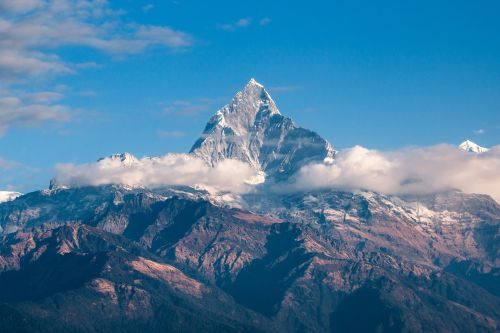
You might be surprised to know that traveling in Nepal is pretty cheap. Everything is cheaper in this landlocked country, from necessities to booking a room in luxurious hotels.
On average, a traveler will spend around $20 to $30 daily. It might cost you even less in some regions. Furthermore, the most a traveler will likely spend is $70 or more daily. This includes basic accommodation, food, transportation, and activities.
Check Out These Handpicked Activities:
Accommodation
You don’t have to worry about accommodation while traveling to Nepal. It has many resorts, hotels, lodges, hostels, and guesthouses. Moreover, these properties are cheap and will fit right into your budget.
The average Nepal hotel price is $35 or lower. You can easily book a room in a 2-star hotel for $1 for a night. That’s way too cheaper than anywhere in South Asia.
Similarly, the average price of luxury hotels in Kathmandu is $60. The price could range up to $300 but won’t exceed more. If you want to check budget-friendly hotels in Kathmandu, visit Booking.com.
Also Read:
Meal Cost
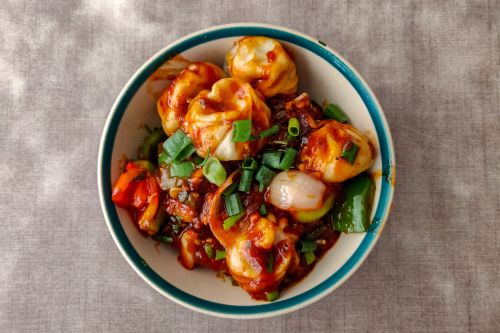
Like accommodation, food costs are cheaper in Nepal than in other countries. For example, the average meal price in a cheap restaurant is $1.9 per person. For a three-course meal in a mid-range restaurant, you will likely pay $15 for two people.
The average price for a fast food meal is $6.4. Likewise, groceries are cheaper in Nepali local markets and supermarkets, with a dozen eggs costing $1.4 and a water bottle $0.24.
Beverages are not expensive either. You can buy a bottle of wine, beer, and water below $7. The cost might vary per restaurant and establishment. If you want to know more, read the following article:
Transportation
As mentioned before, visitors can’t access private vehicles without a Nepali license. So, they must take public transportation like buses, taxis, and motorcycles.
Public Buses and Tourist Buses
Public buses are the least expensive transportation medium in Nepal. Local transport costs range between $0.15 and $0.38 in Kathmandu. Furthermore, minibusses, local buses, and tempos are in city areas like Kathmandu, Bhaktapur, Patan, Banepa, and Pokhara.
Additionally, traveling agencies will provide tourist buses to accommodate your stay. They come with AC and reclining seats and are more comfortable than public buses. These tourist buses take passengers inside and outside the Kathmandu valley, like Birgunj, Nepalgunj, Lumbini, etc.
Cars/Taxis
If public buses are out of your comfort zone, you can order taxis for $0.75 on average. These private cars will wait for you and take you wherever you want. What’s more, you can bargain the price beforehand with drivers.
These days, traveling apps like Pathao and inDrive are popular among Nepali people. After registering, you can order a vehicle at your price and designation.
Commercial Flights
Finally, tourists can board a plane for long-distance travel. You will have to book a flight from the Tribhuvan International Airport. Tourists often take flights to Pokhara, Lumbini, Everest Base Camp, and other tourist attractions.
Unfortunately, Nepal’s geographical topography has made flying very challenging. Also, many Nepali airports are closed due to a lack of passengers in the districts of Dipayal, Darchula, and Sudurpashim. You must book tickets for night/day buses in such instances.
Where to Visit in Nepal?
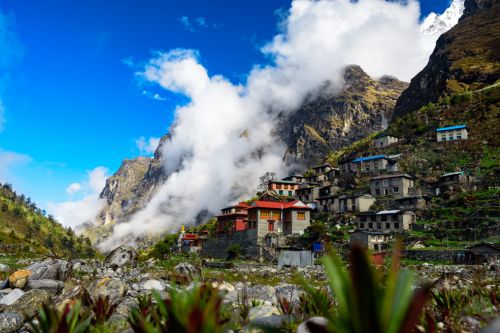
There are numerous visiting places in Nepal. From the incredible Kathmandu Valley to the religious Lumbini district, each destination will provide visitors with a new experience. Aside from natural scenic spots, this country has established many tourist attractions.
Here are some of the famous places to visit in Nepal:
- Pokhara for those interested in boating and adventure sports. It is also a suitable place for honeymoons and couples.
- Kathmandu Valley for those interested in visiting UNESCO World Heritage sites.
- Lord Buddha’s birthplace, Lumbini, is a spiritual retreat for peace and medication.
- Bandipur is for those looking to explore Newari culture and tradition.
- Chitwan National Park for those interested in wildlife safari and bird-watching.
- Annapurna Base Camp Trek for trekking and hiking enthusiasts.
- Chandragiri Hill Station for those interested in riding cable cars.
- The driest valley, Muktinath, houses the Muktinath temple, a holy shrine for Hindus and Buddhists.
- Ancient village Chitlang for those looking to explore historical sites.
- Everest Base Camp is for those interested in Everest views and trekking.
- Langtang National Park and Shivapuri National Park
- Janakpur houses the legendary Janaki Temple and many Hindu shrines.
- Sagarmatha National Park for those interested in wildlife.
- Daman Hill Station is for those interested in watching sunrises and sunsets.
- Kalinchowk is famous for its panoramic mountain views and snowing activities in the winter.
Check These Handpicked Activities:
- Annapurna Basecamp Helicopter Landing Tour
- Chandragiri Hills Tour by Cable Car Ride
- Everest Base Camp Helicopter Tour Stop at Everest View Hotel
- Upper Mustang Trek – 12 Days from Pokhara Nepal
- Janakpur 2 days 1 night Tour from Kathmandu
Best Things to do in Kathmandu
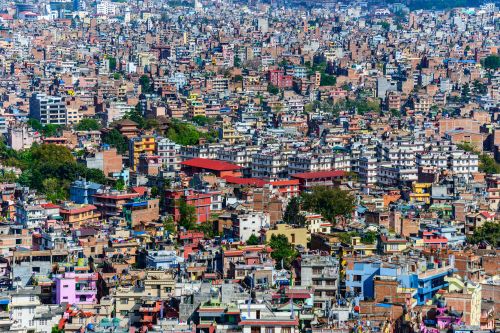
Most tourists start their excursion in Nepal’s capital city, Kathmandu. You will initially land at the Tribhuvan International Airport before moving to other travel destinations in Nepal.
And what better way to start your journey than by roaming Kathmandu? The city is the hub of cultural heritages, tourist attractions, and historical monuments. Its seven architectural sites are even listed as UNESCO World Heritage Sites.
Swayambhunath Temple
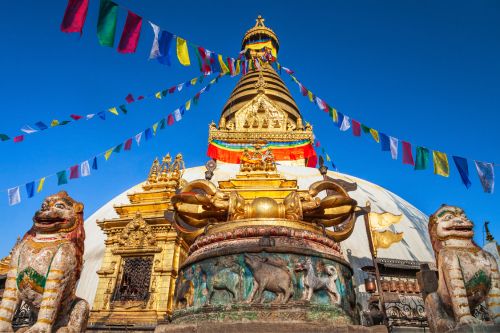
Also called the Monkey Temple, Swayambhunath Temple is the holy shrine for Buddhists. Built in the stupa style, this shrine looks marvelous with Buddha’s eyes and eyebrows painted on it. Tibetan prayer flags are hung from its top.
Travelers have to visit this Swayambhunath temple at least once on their trip. They will enjoy a peaceful environment and watch stunning panoramic views. Moreover, they must try Laphing, Thukpa, momos, and keema noodles from the shops around Swayambhu.
Check Out This Handpicked Activity:
Visit Kathmandu Durbar Square
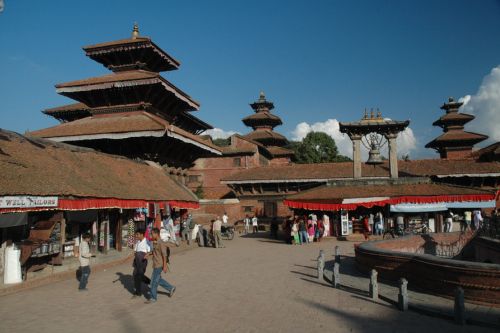
Kathmandu Durbar Square is a visual delight listed in the World Heritage Site. Its pagoda-styled Nautalle Durbar pays homage to ancient Nepali tradition. Prithvi Narayan Shah built the nine-storied palace after unifying Nepal into one state.
Another impressive building in Kathmandu Durbar Square was Kasthamandap. Legend has it that the giant wooden structure was made using the wood of a single tree. Sadly, the 2015 earthquake severely damaged the building.
Check Out This Handpicked Activity:
Go For a Hike in Shivapuri
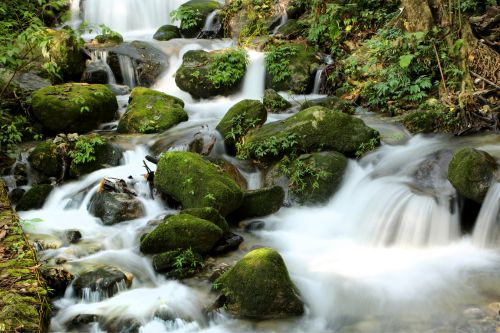
Kathmandu Valley is surrounded by green mountains that are suitable for hiking. Speaking of which, Shivapuri National Park is perfect for hikers who enjoy a day hiking trip.
Hikers will get two routes, Baghdwar and Bishnudwar, to choose from. Each path will see lush greeneries, thick forests, waterfalls, and wildlife. It takes hours to reach the top, so visitors must be well-prepared to walk long distances.
After taking several detours, you will finally reach the top. There, you will see gorgeous scenery and picturesque views. Feel that; that’s the feeling of ultimate satisfaction.
Check Out This Handpicked Activity:
Enjoy Local Delicacies
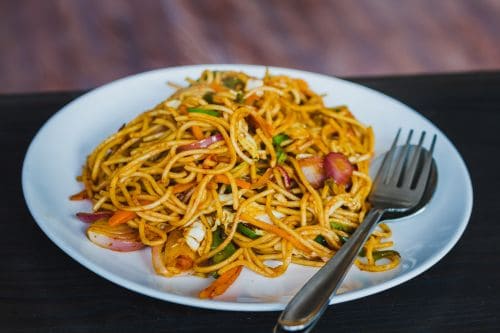
No trip is complete without food; the Kathmandu trip is no exception. You have to try traditional Kathmandu cuisines during your visit. Furthermore, the city’s famous includes Thakali Khana Set, Newari cuisine, and Tibetan food.
The Local favorite is delicious momos. These are dumplings with veg and non-veg filings available steamed, fried, with/without soup, and in tandoori versions. They are served in almost every eatery, so you must try them at least once.
If you want to learn more things to do in Kathmandu, head here for the details.
Check This Handpicked Activity:
Best Things to do in Bhaktapur
Bhaktapur is another famous travel destination in Nepal. It houses many historical and cultural heritage sites that are worth your visit. You will be busy throughout your trip to Bhaktapur, visiting places and exploring new things.
Visit Nyatapola and 55-Window Palace
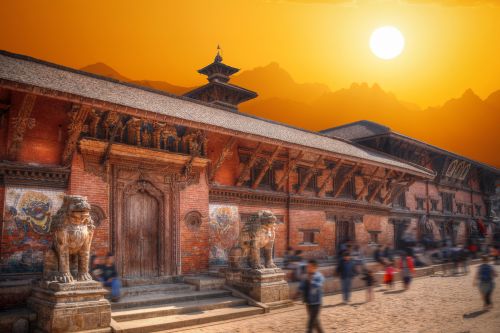
Travelers must visit Nyatapola and 55-Window Palace situated at the Bhaktapur Durbar Square. The former is a gigantic five-storied temple made from impressive woodwork. It has many stone statues and carvings of Siddhi Laxmi.
Likewise, 55-Window Palace pays homage to the Malla arts and architecture. It has fifty-five wooden windows that are beautifully carved and reflect ancient Nepalese people’s skills. Moreover, Bhaktapur Durbar Square houses the Golden Gate, Art Museum, Taleju Temple, and more.
Check This Handpicked Activity:
Try Local Delicacies
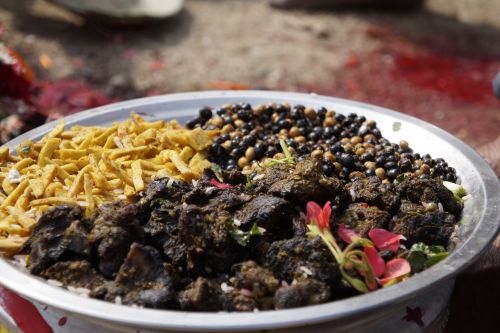
You must try Bhaktapur delicacies during your visit. The city has diverse food options to choose from. For instance, Newari cuisine is super delicious and includes veg and non-veg options. Some dish recommendations are Choila, Bara, and Sekuwa.
Another must-have food is Bhaktapur curd, Juju Dhau. This yogurt is refreshing, sweet, creamy, and delicious. Its popularity has led to it being named King of Curd.
Participate in Festivals and Celebrations
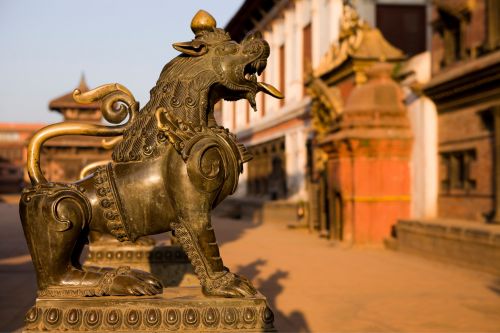
In Bhaktapur, do as the Bhaktapurians do. You can enjoy everything in this city by being an active participant. For instance, you can participate in local festivals and celebrations.
Bhaktapur residents celebrate many jatras and Newari festivals throughout the year. You can participate in these celebrations and enjoy them as locals. However, you better act cautiously as these celebrations are rowdy and chaotic.
Check This Handpicked Activity:
Enjoy Sunrise from Nagarkot

If you enjoy hiking and trekking, you can do that in Bhaktapur’s Nagarkot. The hill station is renowned for its scenic panoramic sunrise and sunset views. It is one of the famous tourist spots in Nepal.
Travelers can reach Nagarkot through multiple routes. For example, they can start their trip from Sundarijal, Chisapani. Or, they can travel from Shankhu to Nagarkot. Whichever the route is, the ultimate destination is to see the golden sunrise from the top.
Check This Handpicked Activity:
Best Things to do in Pokhara
Nepal’s most famous tourist attraction has to be Pokhara. The ultimate Honeymoon destination for couples, this place has many scenic spots, historical monuments, and sightseeing features. You will have a handful of things to do in Pokhara.
Boating in Phewa Lake
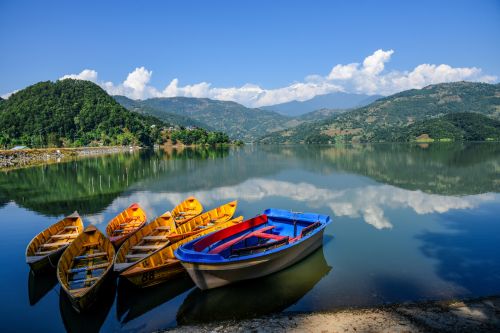
As mentioned before, Pokhara is suitable for couples to enjoy their honeymoon. And what better way to do that than having a romantic boat ride?
Phewa Lake boating is as famous as the London Thames Cruise. The couples enjoy paddling the boat while taking in the stunning mountain views. You can ask for a paddler or hire a boat for yourself.
Phewa Lake faces the marvelous Annapurna Range and lush forests of Anadu Hill. Boating in this lake is like a peaceful retreat from the chaotic city life. You can book a boat for 30 minutes, an hour, or a whole day to enjoy your time.
Check These Handpicked Activities:
Enjoy Sarangkot Sunrise View
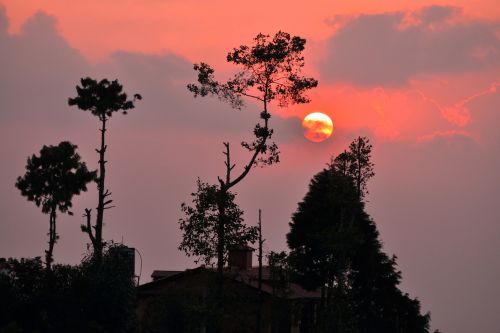
Another must-do thing in Pokhara is to enjoy an early sunrise view from Sarangkot Hill. The scenic hill station offers panoramic views of the Annapurna Range and Machhapuchhare Mountain.
Even if you are not a morning person, Sarangkot’s mesmerizing sunrise views will make your early getting up worth it. Additionally, you can enjoy paragliding from the hill. You will get aerial views of Machhapuchhare Mountain, Mt. Everest, and Annapurna Range.
Check Out This Handpicked Activity:
Go For Hiking and Trekking
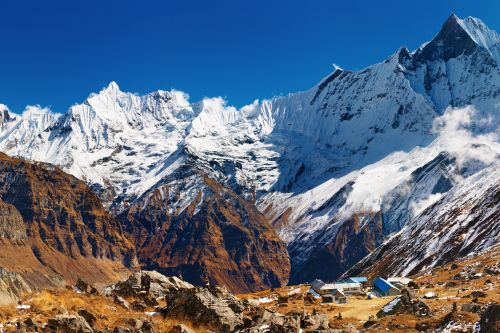
If you are into hiking, Pokhara offers several hiking and trekking tours. The people-favorite has to be Annapurna Base Camp trekking. You will trek through natural paths and see beautiful landscapes. At the base camp, you will see the Annapurna, Gangapurna, and Himchuli Mountains up close. Furthermore, the tour packages extend from 7 days to 14 days or more.
Likewise, Mardi Himal Trek offers epic mountain and sunrise views. Its rocky path goes through remote villages where you can interact with locals. Other hiking and trekking trips include Ghorepani Poon Hill Trek, Sarangkot Hiking, Ghandruk Loop Trek, and Panchase Trek.
Check These Handpicked Activities:
Indulge in Adventurous Activities
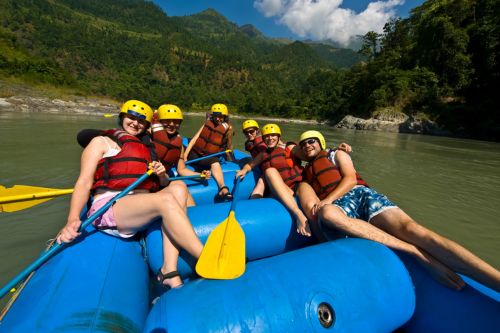
The Pokhara trip is about peaceful exploration and includes activities that will push you beyond your limits. We only live once, so we must explore any thrilling activity or option when available. But, again, no pressure; this is your trip, and you will be the one to decide.
Still, if you want to participate in adrenaline-surging activities, we suggest paragliding from Sarangkot Hill. You must fly from the hill station to enjoy Mount Annapurna’s gorgeous views.
Another adventurous activity has to be rafting. Pokhara’s Upper Seti River’s violent and rapid water flow will surge your adrenaline. The 30-minute ride will be the best rafting experience you will ever get to experience.
Check These Handpicked Activities:
If you want to know more things to do in Pokhara, head over here for details.
Best Things to do in Nagarkot
Nagarkot is the scenic hill station at Bhaktapur. The village is a serene and peaceful retreat away from the Kathandu’s chaotic scenes. Moreover, the place has many tourist activities and attractions to spark interest.
Hiking and Trekking

Nagarkot is perfect for hiking and trekking trips. Frankly, it would be weird if you didn’t go hiking, as this hill station is renowned for its hiking routes. Also, that is the first thing any visitors do in Nagarkot.
The hill station’s most-used hiking route is the Nagarkot Panoramic Hiking Trial, which is 3-4 hours long. Others are Nagarkot 360 View Tower Walk, Nagarkot-Dhulikhel hiking, and more.
Similarly, trekking is another famous tourist activity. Longer than hiking, trekking tours lead visitors to the top through Nagarkot’s lush jungles, spectacular landscapes, and scenic spots. There, they will see breathtaking sunset and sunrise views.
Check These Handpicked Activities:
Visit Nagarkot Buddha Peace Park
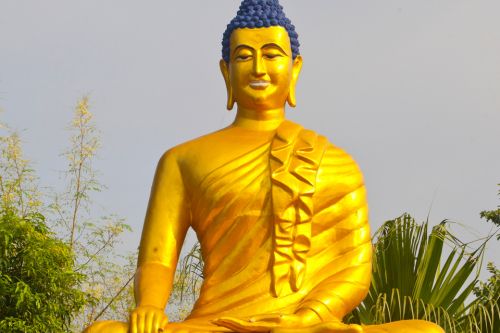
If you feel tired from your hiking trip, you can take a breather at the Nagarkot Buddha Peace Park. It is only a few steep steps from the Nagarkot View Tower. The green hills and the Himalayas surround it.
Buddha Park has a golden statue of the Earth, Touching Budhha. It also houses the Buddha Monastery on its premises. Moreover, the park is open for visitors 24 hours a day and doesn’t cost an entry fee.
Enjoy Local Lifestyle
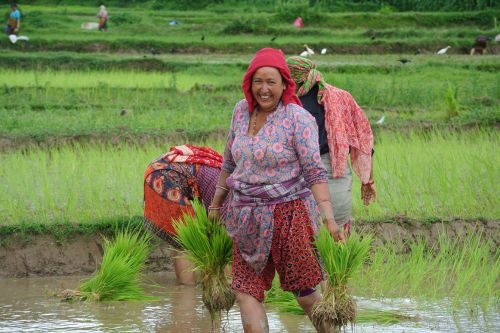
Nagarkot is a small village where you will interact with visitors more or less. The residents are hospitable and friendly and will welcome you as their own. Hence, you won’t have to fear feeling left out in this village.
Furthermore, visitors can learn about local traditions, culture, and lifestyle and adopt them during their stay. For instance, they can try rice planting if they visit during the monsoon season.
Check Out This Handpicked Activity:
Explore Restaurants and Hotels
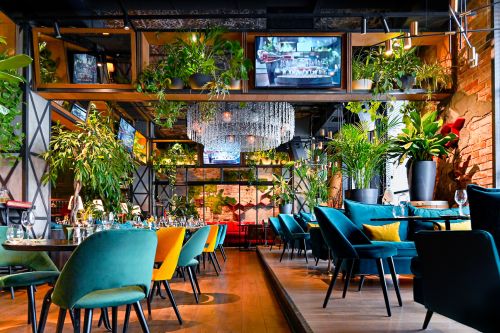
Nagarkot houses some of Nepal’s finest hotels, resorts, restaurants, and lodges. The place is full of tourists during the on/off seasons, so you might have to book a room prior.
But it isn’t that challenging to enjoy a luxurious stay in Nagarkot. Many renowned establishments like Hotel Mystic Mountain, Cafe Du Mont, Everest Manla Resort, etc. If you want to get more details, check the following article:
Best Things to do in Lumbini
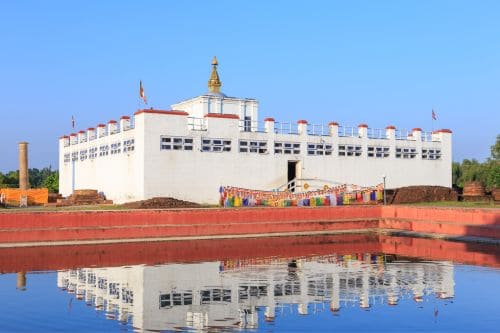
Lumbini is Nepal’s holy land and sacred pilgrimage site of Buddhists. Historically, Kapilvastu Kingdom’s queen, Maya, gave birth to her son, Siddhartha Gautam, in the garden of Lumbini Park. The little boy later became Buddha and founded Buddhism.
After the unification of Nepal, Lumbini became part of the nation; hence, Nepal became the land where the Buddha was born. At present, Lumbini is a sacred site for Buddhists worldwide.
There are many things to do in Lumbini, some of which are as follows:
- Visit Maya Devi Temple, a Buddhist shrine dedicated to Lord Buddha’s mother, Maya. It is listed as a UNESCO World Heritage Site.
- Visit the Ashoka Pillar, a gigantic stone pillar erected by Emperor Ashoka during his Lumbini visit. It marked Lumbini as Buddha’s birthplace.
- Tie colorful prayer flags around the legendary Bodhi Tree. Locals believe any wishes you make while tying flags will be granted.
- Take pictures around the Maya Devi pond. The legend says Lord Buddha’s first bathing happened there. Also, Queen Maya used to take her bath in the pond.
- Explore Lumbini Museum’s artifacts, metal sculptures, old coins, manuscripts, and stamps.
- Visit Sri Lanka Monastery, Cambodian Monastery, and Myanmar Golden Temple.
- Visit Dae Sung Shakya Sa, the Korean temple in Lumbini.
- Explore the Royal Thai Buddhist Monastery and Zhong Hua Chinese Buddhist Monastery.
- Enjoy the village life of Tilaurakot.
- Try local foods, street snacks, and Tibetan cuisines.
- Sign up for meditational classes. There are plenty of classes available in Lumbini.
- Go on a walk or bicycle ride for sightseeing. Explore villages, communities, and rural terrains.
Check These Handpicked Activities:
- Full Day Lumbini Tour
- Private Lumbini And Kapilvastu Buddhist Pilgrimage Tour
- Lumbini Tour With Local Guide
Nepali Food
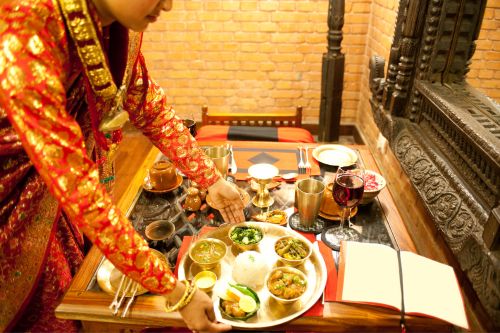
Nepali food culture is diverse and strongly linked with Nepal’s geography, ethnicity, and community. While primarily city people consume rice and lentils, the same couldn’t be said for the overall population. For example, the remote villages in the Himalayan region can’t produce rice, and people survive on potatoes, maize, and such.
Nepali food combines traditional Indian, Tibetan, and Thakali cuisines. The Western culture has also significantly influenced Nepali food culture, as seen prominently in youths’ preference for pizzas, pasta, sandwiches, burgers, and coffee.
Nepalese people’s eating behavior is also slightly different than in Western countries. We normally start our day with tea or coffee at 6 AM or 7 AM. Before leaving for work, we eat dal-bhat (rice and lentils) around 9 AM or 10 AM. Afterward, people enjoy a light meal, called Khaja, around 1:30 or 2 PM.
Then there is a tea time at around 4 PM. Finally, we end our day by enjoying dinner at 8 or 9 PM. To summarize, Nepalese people enjoy three meals a day with tea breaks in between.
Nepali dishes are way too many to count. Nonetheless, we have categorized famous Nepali cuisines down below:
Traditional Dal Bhat
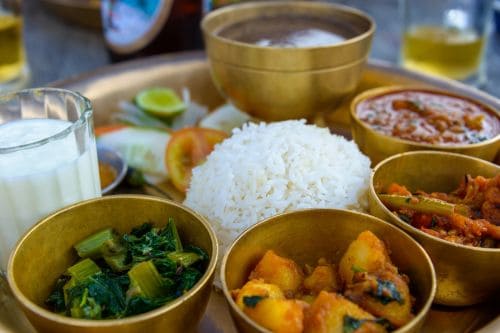
Dal Bhat is the most commonly eaten dish in Nepal. Bhat is a steamed or boiled rice, whereas dal is a stew made from various pulses. Together, they form a morning meal accompanied by vegetables and pickles.
Sometimes, people eat Dal Bhat without any veggies or side dishes. It is super delicious, easy to cook, and won’t take much time for preparation. Moreover, Dal Bhat is nutritious and contains carbohydrates, vitamins, protein, and fibers.
You don’t have to eat Dal Bhat every day of your trip. But you can include them in your lunch schedules. It will give you more energy to enjoy your travel.
- Where To Eat: Local restaurants, hotels, and resorts of Kathmandu, Bhaktapur, and Patan.
- Price Range: $1.89 – $5.28
- Famous Eateries: Bhojan Griha, Krishnarpan Restaurant, Nepali Chulo
Thakali Khana
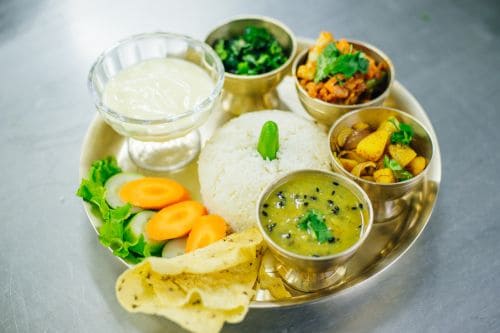
Thakali Khana is a better version of traditional Dal Bhat. It includes Dal Bhat as the main dish, but the set will also contain multiple vegetable curries, ghee, meat, Kanchhemba, and pickles.
Originally consumed by the Thakali ethnic group, the Thakali khana set has become a main course in renowned Kathmandu restaurants and hotels. The full Thakali set contains Dal Bhat, vegetables, Mustang Alu, meat variations, Timur pickles, Kanchhemba, and ghee.
It is presented on a thali with rice in the middle, surrounded by side dishes. A perfect combo of health and taste, this visually appealing meal will make you full and satisfied.
- Where To Eat: Authentic Thakali Kitchens in Thamel, Baneshwor, and Bhaktapur
- Price Range: $3.77 – $11.31
- Famous Thakali Restaurants: Jimbu Thakali, Tukuche Thakali Kitchen, Thakali Ghar Aangan
Newari Cuisine
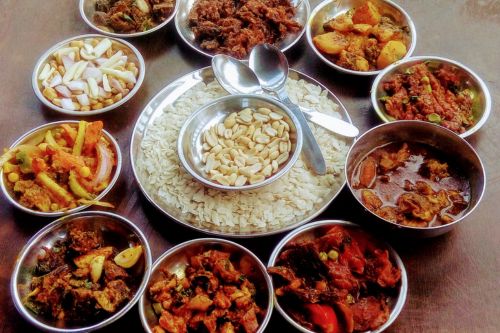
The beloved Newari Cuisine is the dish of the Kathmandu residents. It is a diverse set of over 200 Newari dishes that reflect Newari food culture. Moreover, these dishes can be eaten as light meals, snacks, or a heavy feast.
Newari cuisine is primarily non-veg, with limited options for vegetarian and even fewer for vegan dishes. Nonetheless, the available food items are delicious and will make you return for more.
Some local favorites are Sekuwa (barbecqued buff meat), choila (marinated buff, pork, and chicken meat), Dugula (goat meat curry), Kachila (marinated raw minced buff meat), Pukula (fried meat intestine), Kwati (stew of sprouted beans), Samaybaji (a set of beaten rice, veggies, meat, cowpea, & soybean), momocha (dumplings with veg/non-veg fillings), and more. Besides these, there are salads, desserts, drinks, and snack options.
- Where To Eat: Eateries in Bhaktapur, Kathmandu, and Patan
- Price Range: $0.38 onwards
- Famous Destinations: Bhatti Restro, Harati Newari Restaurant, Lhosha Ghasha
Tibetan Cuisine
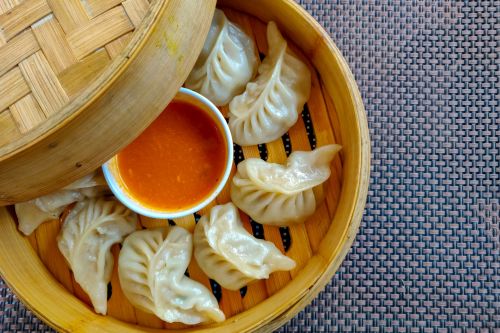
The majority of Nepali people follow Hindu and Buddhist religions. Tibetan Buddhism also has a massive influence on Nepali Buddhists. Hence, it is no surprise to see Tibetan styles, including cooking style’s influence among residents.
Speaking of which, momo is the must-have dish in Nepal that is influenced by Tibetan food culture. These steamed meat-filled momos come with tomato sauce or soup. They are also available in fried, chilly, and marinated versions.
Other local favorites are Chowmein, laphing, thukpa, and keema noodles. The latter is famous among youths who enjoy eating spicy noodles. Moreover, they are cheap and will fill you up.
- Where To Eat: Restaurants around Swayambhunath, Boudhanath, and monasteries
- Price Range: $0.75 onwards
- Famous Destinations: Famous Laphing House, Cold And Hot Spicy Noodles, Delicious Laphing Center
Nepali Street Food
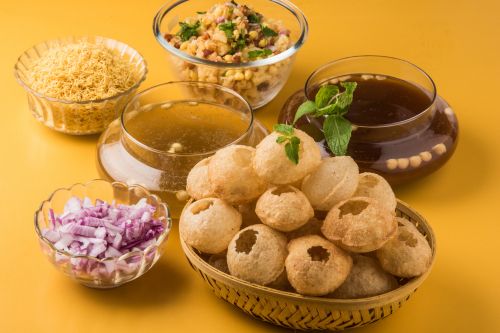
Eating healthy is good, but sometimes you crave street food, whose food safety could be questionable. Still, we can’t stop trying to stick foods, fried dishes, and everything we can find in vendor shops.
No worries, folks, if you are suddenly urged to try street food, Nepali streets are filled with local stalls and shops. I recommend Pani Puri, a breaded sphere filled with boiled potatoes, chickpeas, nuts, and onions and served by dipping in spicy water. I can’t guarantee health, but I pledge for its yumminess.
Other must-try Nepali street food items are:
- Momos: dumplings with veg and non-veg fillings
- Chatamari: a delicious Newari pizza
- Samosa: a triangular pastry filled with potatoes, green peas, onions, and chili.
- Sel Roti: a ring-shaped rice flour bread.
- Dahi Puri: a different variation of Pani Puri made by adding curd and sev.
- Bara: a Newari pancake available in veg and non-veg options.
- Laphing: a cold Tibetan noodle dish served dry or with soup.
- Lassi: a cool yogurt-based smoothie.
- Bhakkha: a steamed fluffy rice cake.
Many more street foods are available, which you must try firsthand while roaming Nepali streets.
- Where To Eat: Streets of Thamel, Bhaktapur, Samakhusi Marg
- Price Range: $0.38 onwards
- Famous Destinations: Lokpriya Sel Roti Bhandar, Yomari Corner, Up Street Food Cafe
Top Things to Buy in Nepal
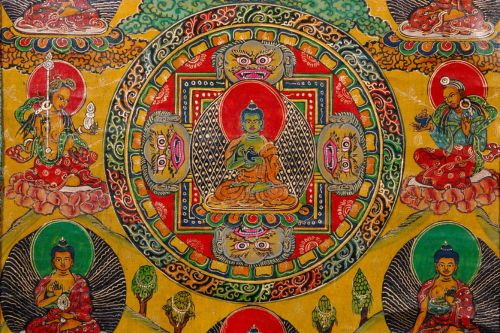
After visiting all recommended destinations, enjoying local food and delicacies, and spending much time, sadly, it will be time to return home. But we won’t let you go empty-handed. You should have at least some souvenirs as memory keepsakes.
So, here we have the list of top things to buy in Nepal to take back home:
- Beautifully made Thangka Paintings
- Light-weight, soft, and elegant Pashmina Shawls
- Sharper than any knife in the world, Khukuris
- A blend of aroma, health, and taste, Nepali Teas
- Small yet aesthetic Nepali bead jewelry
- Traditional Nepali attires like Dhaura Suruwal, Saree, and Haku Patasi
- Handmade handicraft items
- Stone and wooden statues
- Traditional masks and puppets
- Delicious eatables like lapsi, titaura, and chhurpi
To learn more about these items, head over to the following article:
Check These Handpicked Activities:
- 2 Hour Beads Bracelet Workshop In Kathmandu
- Knife Khukuri Making Workshop
- Thangka Shopping In Kathmandu
Sadly, it’s the end of our ultimate guide to Nepal blog. Nepal is more than a tourist destination and has much to offer. To fully understand this, you must visit this landlocked South Asian country.
Nepali people are always eager to meet visitors and will welcome you with open arms. Also, you may experience some health hazards like altitude sickness, motion sickness, and such. So, it’s better to be prepared beforehand.
But one thing we guarantee is you won’t be homesick. So, do come and explore Nepal.
